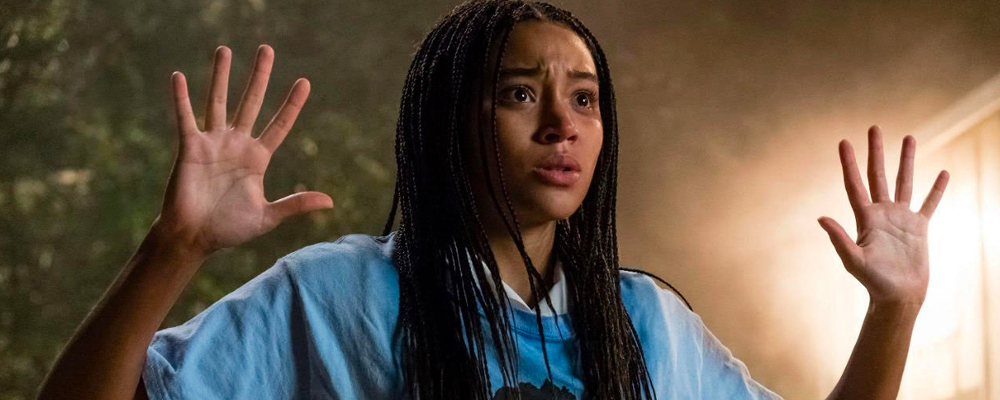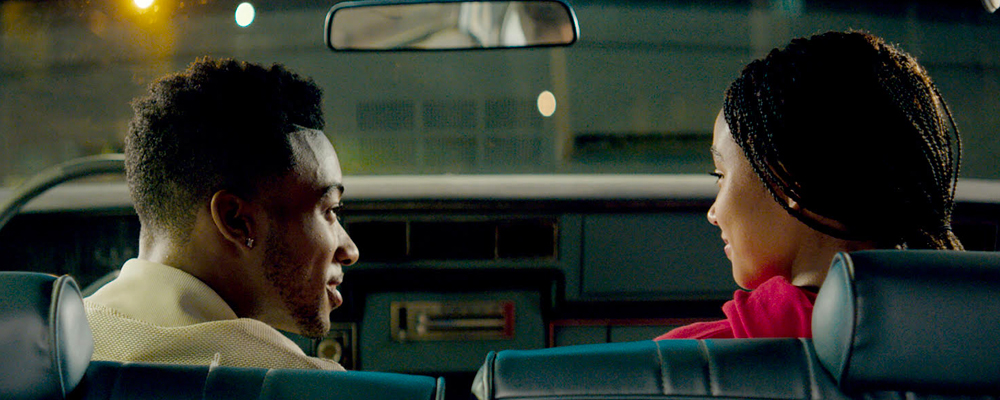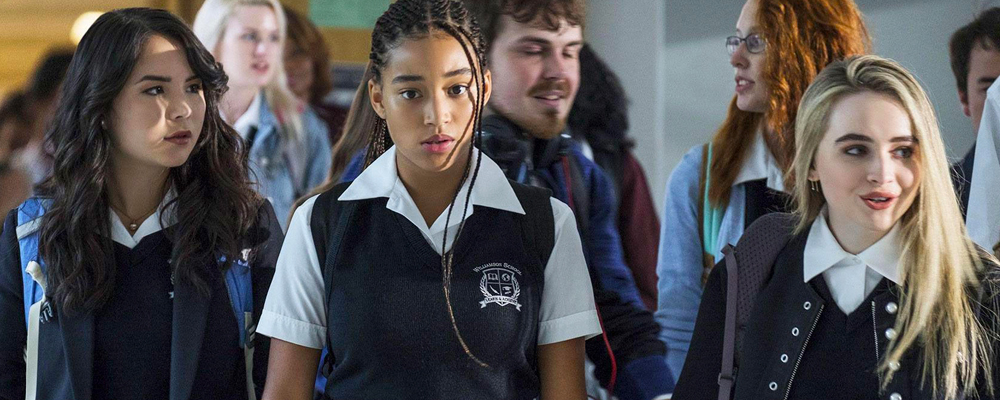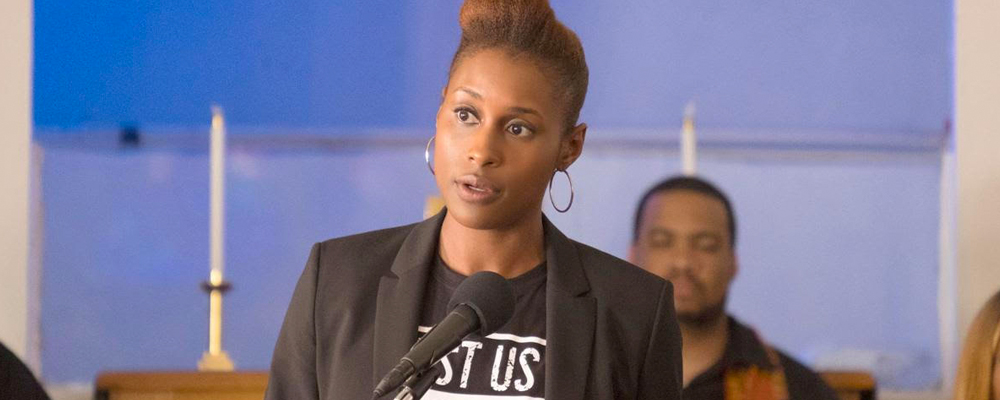‘The Hate U Give’: Riveting Drama Tackles Black Lives Matter and Current Racial Conflicts
Alci Rengifo
“The Hate U Give” uses the young adult genre to tackle head on some of our most pressing social debates. It does so with intelligence, heart and bravery you rarely see even in more “adult” films. It works well precisely because it explores provocative issues like race, class and police brutality from the angle of those formative high school years. Based on the acclaimed novel by Angie Thomas, it follows a young African American girl who experiences adolescence on a social bridge between affluent America and the communities mired in poverty and violence.
Starr Carter (Amandla Stenberg) was born and raised in the fictional neighborhood of Garden Heights, but it could easily exist anywhere in contemporary America. Her father Maverick (Russell Hornsby) teaches Starr and her siblings early on about the Black Panther charter and the necessity of being aware of what to do if they ever get stopped by the police. More concerned with helping the kids move out of Garden Heights and its downtrodden atmosphere, where a drug gang led by King (Anthony Mackie) operates, Starr’s mother Lisa (Regina Hall) has managed to place her in a private school on the other side of town. At Williamson Prep Starr is introduced to the blunt class disparities in her world. The white, upper class kids talk in slang to look cool and Starr keeps her nice but quite Caucasian boyfriend Chris (K.J. Apa) secret from Maverick. One night Starr goes to a party in Garden Heights and meets a childhood friend, now grown up named Khalil (Algee Smith). When a fight breaks the party up, Khalil and Starr go for a drive but get pulled over by a white police officer. For what? It’s never clear. But one sudden move and Khalil is dead, shot down by the cop. Being the only witness, Starr suddenly finds herself caught between clashing views and social forces in her community.
Among young adult dramas this year “The Hate U Give” is one of the best. Its craft and voice appeals to a wide audience, but as a work about the experience of youth it poses challenging questions and raises social topics rarely dealt with so directly. The screenplay by Audrey Wells almost has the tone of the kind of conscious dramas made in the 1970s and 1980s. Maybe it’s because these are such furious times, when holding back opinions is quickly fading away. This is an angry, but wise film. Director George Tillman Jr. has combined social commentary and engaging cinema before in films like “Barbershop,” “Soul Food” and the Notorious B.I.G. biopic “Notorious.” In all of those films the characters felt like authentic, flawed individuals grappling with being small players in a wider world of discrimination, societal codes and cultural baggage.
With “The Hate U Give” Tillman not only deals with the issue of police shootings of African Americans, but with the wider cultural and social implications. Starr is having a good time at her prep school, until Khalil’s shooting exposes divisions that are usually hidden. While her community takes to the streets out of collective rage, her classmates do a “walk out” which is no more than an excuse for the suburban kids to skip class (some even holding “Black Lives Matter” signs). Starr is also astounded when her friend Hailey (Sabrina Carpenter) regurgitates a conservative defense of the officer who killed Khalil, which leads her to notice the ways Hailey can be unconsciously racist. But Tillman isn’t painting the prep school world as simply whites as racists, what he does so well is display how American society is still a class system. It’s hard for one sector of society to understand the plight of another if they never interact.
In the tradition of directors like John Singleton and the Hughes Brothers, Tillman also focuses his lens on the African American community to dissect the roots of ongoing struggles. There are no innocents, but individuals living under a specific system. Garden Heights is a portrait of few opportunities and despair cured with drinking, drugs and petty local feuds. But the film isn’t a judgmental piece. Maverick sits Starr down to explain why drug dealers like King emerge out of socio-economic despair, creating a deadly cycle that does little to cure inequality. Once Starr decides to testify, and possibly expose that Khalil might have been a drug dealer, she receives threats from King and his thugs, while dealing with the cluelessness of her schoolmates. In the world of this film, inequality breeds more crime, and the system responds by patrolling poor neighborhoods as if they were wartime Baghdad. There are scenes of real anger, beginning with the shooting of Khalil which has a nightmarish intensity. In another scene Maverick is slammed against a restaurant window by the police, in plain view of his family. There is a sharp bite to a scene where Starr challenges her cop uncle, Carlos (Common), to admit he would frisk a white person differently than a black one. The clearest reference to ongoing struggles is the emergence of a Black Lives Matters-style movement led by an activist named April Ofrah (played by Issa Rae of HBO’s “Insecure”). Rae embodies the modern activist emerging from communities finding expression through the act of protest. She urges Starr to testify as a way of attaining her own voice and strength.
“The Hate U Give” is far from a timid film however, and it has scenes that work like incandescent statements. After a face-off with police, Maverick lines up the kids on the front lawn, telling them to recite the Black Panther charter he has taught them over the years. He demands they be proud of their roots, and the film makes no apologies for showing a fictional version of the Black Lives Matter movement as a necessary, civic response to abuses of power. This is balanced with some strong drama and likeable characters. Starr’s boyfriend Chris, played by “Riverdale” star K.J. Apa, is not written as just the token nice white guy. He genuinely cares for Starr, even as he tries to understand what she is living. In one great scene during prom he tries to make the argument that he doesn’t see skin color, only personality, and Starr replies, “if you don’t see my blackness then you don’t see me.” The relationships between teenagers in this film are unique in how they debate race, and how they deal with social conditioning they’re mostly oblivious to.
If “The Hate U Give” up to now sounds like a dense political film it is not. It’s a great young adult drama, unique in how it deals with a specific social issue. It is challenging, as it should be, because cinema should deal with what’s happening in the world. Even while much of the audience will be riveted on a purely cinematic level, the real value of this film is the discussions it will inspire after the end credits roll.
“The Hate U Give” opens Oct. 5 in select theaters and expands Oct. 19 nationwide.




